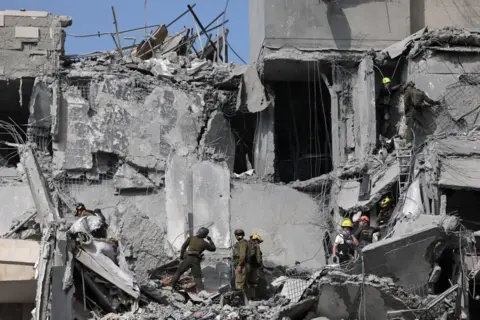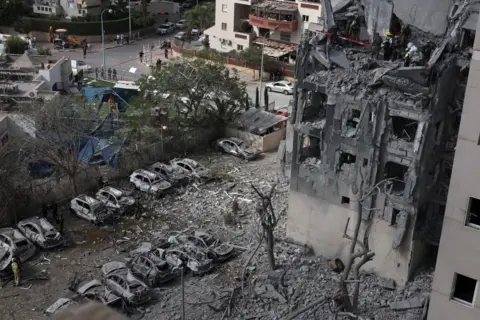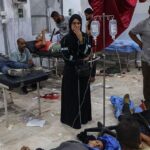Introduction
In the early hours of June 24, 2025, just before a ceasefire between Iran and Israel was set to begin, the southern Israeli city of Beersheba was rocked by a devastating missile strike. Residents were jolted awake by blaring phone alerts and sirens warning of incoming attacks. The strike, believed to have been launched from Iran, resulted in the deaths of four civilians and extensive property damage. The missile strike in Beersheba is one of the deadliest in the recent conflict escalation.
Chaos in Beersheba: Safe Rooms Couldn’t Save All

Merav Manay and her family were among the many who ran to their safe room—a reinforced concrete section of their apartment—when the alarms went off. As the missile hit nearby, their building shook violently. “It was so strong that we thought it was the end,” she told the BBC. Though her family survived, the impact shattered their windows and left debris strewn across their home.
Just across the street, another apartment block was not so fortunate. It took a direct hit and partially collapsed. All four people who died were reportedly inside their safe rooms at the time, highlighting the sheer power of the missile.
Scenes of Devastation
In the aftermath, Israeli military and medical teams, joined by local volunteers, rushed to rescue survivors and clear the wreckage. Streets were filled with shattered glass and rubble. Oren Cohen, a local resident, was visibly shaken as he surveyed the damage to his garden and home. “I was worried about my kids… only now am I starting to realise what happened,” he said.
Despite the personal impact, Oren expressed support for Israel’s military response to Iran. “We do what we have to do to protect ourselves,” he added in the Al Jazeera report.
Ceasefire Already in Jeopardy
While both countries claimed they had agreed to a ceasefire after the Beersheba strike, each accused the other of breaking it. Iran launched more missiles at 10:30 AM, just hours after the supposed truce was announced. Israel vowed to respond, deepening fears that the worst may not be over.
According to Reuters, the ceasefire had barely taken effect before both sides resumed attacks. Many Beersheba residents, still grappling with loss and trauma, are skeptical it will hold. The psychological toll is evident as families cautiously emerge from their homes, unsure of what lies ahead.

Wider Implications of the Conflict
- The attack on Beersheba follows the earlier strike on Soroka Medical Center, also located in the city, on June 19, which left dozens injured and disrupted emergency services.
- Prime Minister Netanyahu condemned the missile strikes as war crimes, citing the deliberate targeting of civilian infrastructure.
- International bodies including the World Health Organization and UN have expressed concern about escalating civilian casualties and violations of international law.
Community Response and Humanitarian Efforts
In a display of unity, volunteers wearing fluorescent vests arrived within hours to assist with clean-up efforts. Aid organizations are distributing emergency supplies, while hospitals brace for further casualties in case the fighting resumes.
Beersheba’s residents continue to show resilience, but the sense of vulnerability persists. “I hope this is the end,” one man told the BBC while sweeping debris from his driveway, echoing a sentiment shared by many in the battered city.
Conclusion
The Beersheba missile strike illustrates the devastating toll of the Israel-Iran conflict on ordinary citizens. Despite fortified homes and emergency protocols, civilians remain at risk. As questions about the longevity of the ceasefire persist, the people of Beersheba are left to rebuild—physically and emotionally.
Stay informed with ongoing global updates from trusted outlets like Reuters World and Al Jazeera News.


Stay informed with real-time updates on the Israel–Iran ceasefire and other developments in the world news section.









